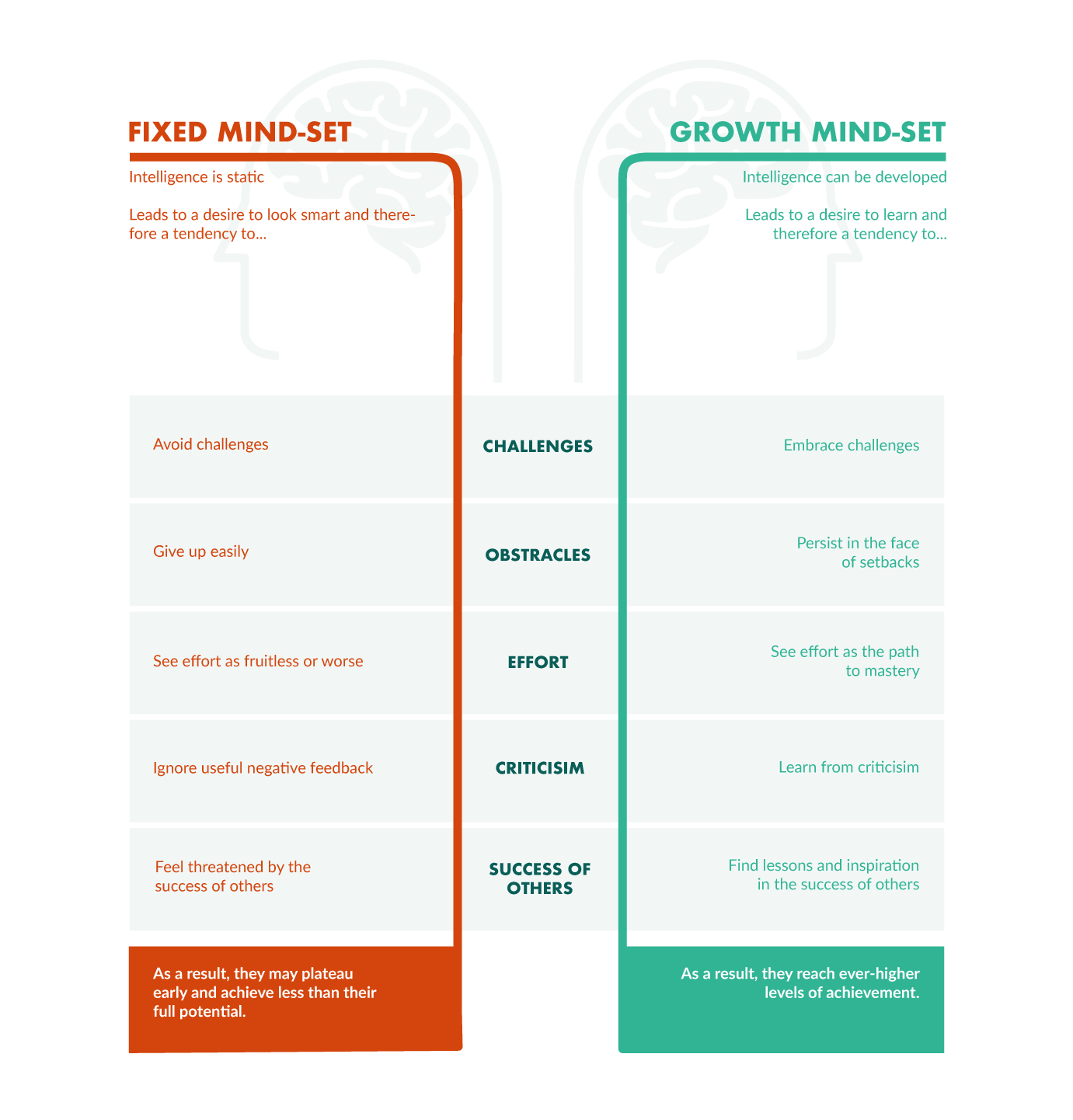Journey to Excellence: How Hard Work and Mindset Unlock Success

Have you ever wondered what makes successful people successful?
No matter the occupation, all successful people have that certain “je ne sais quoi.” That one thing that we can’t put a finger on, but we know we want, because that’s what will help us grow and reach our own goals, whether personal or professional.
You might think that there is a direct correlation between high IQ and success. But extensive research shows that although IQ tests can give a good indication of where someone is within the intelligence spectrum, in and of itself, it is not a good enough indicator of success performance across various groups of people.
Then, you might say that talent is obviously a prerequisite for success.
How else could Michael Jordan become one of the greatest basketball players of all time, as well as one of the greatest athletes of all time, if he hadn’t talent? It must be talent.
Not exactly.
Carol Dweck, Professor of Psychology at Stanford University, says: “Genetics may determine the starting line, but hard work determines the finish line.”

"I’ve always believed that if you put in the work, the results will come. I don’t do things half-heartedly. Because I know if I do, then I can expect half-hearted results."
It’s all in the personality
It turns out that certain personality traits have a lot more to do with success than either IQ or talent.
Nobel Laureate, James Heckman, and his colleagues found that “non-cognitive” skills, such as perseverance, good study habits, and the ability to collaborate – in other words – conscientiousness (or diligence), have a much greater impact on success than IQ.
Conscientiousness may sound really boring, but is one of the Big Five personality test traits that human resources professionals use when placing employees.
It reflects the tendency to be responsible, organized, hard-working, and goal-oriented.
Conscientious individuals tend to be high achievers. They have a high productivity level, they make more money, have good relationships, work satisfaction, and achieve more. In addition, conscientious people tend to land more leadership positions.
A more modern twist on the word “conscientious” is the word “grit” made famous by Professor of Psychology at the University of Pennsylvania and MacArthur Fellow, Angela Duckworth.
"Grit is passion and perseverance for very long-term goals. Grit is having stamina. Grit is sticking with your future, day in, day out, not just for the week, not just for the month, but for years, and working really hard to make that future a reality. Grit is living life like it's a marathon, not a sprint."
There’s another set of personality traits that play an important role in achieving success: determination and perseverance.
Some might think that these two mean the same thing. Although they’re in the same family, they technically mean two different things.
Determination is considered to be a “firm or fixed” intention. It signifies a state of mental resolution and is generally shorter-term.
Perhaps you are determined to end all meetings on time, or close three big deals by the end of the quarter, or launch your company’s biggest online event of the year.
In trying to reach a goal, you will experience ups and your downs, which may knock you off your game. And when this happens, sometimes your determination will come back and sometimes it won’t. If it doesn’t come back, then reaching your goal will just dissolve into thin air.
Perseverance, on the other hand, is long-term. It means doing something despite difficulty or delay in achieving success.
No matter how hard things get, you keep going for it. You keep trying, you test things, you make adjustments and continue for a very long period of time.
The importance of the right mindset
Another important element of success is having the right mindset.
In her book, Mindset: The New Psychology of Success, Carol Dweck describes two different kinds of mindsets - the “fixed mindset” and the “growth mindset”.
Individuals with a “fixed mindset” believe that intelligence is fixed and that they’re either born with talent or they’re not. Therefore, they spend all their time trying to look smart, rather than spending the time to learn and develop.
These are the kind of people that will give up after trying something a few times.
On the other hand, individuals with a “growth mindset” believe that they can be good at anything and that their abilities can grow through perseverance, dedication and the right strategy. Growth mindset individuals don’t let failure define them.

Source: https://www.mindsetworks.com/science/Impact
“Michael Jordan is a prime example of the growth mindset,” says Dweck. He has the mindset that almost every successful athlete who has had long-term success has - that hard work conquers all.

"I've missed more than 9,000 shots in my career. I've lost almost 300 games. 26 times I've been trusted to take the game winning shot and missed. I've failed over and over and over again in my life. And that is why I succeed."
Needless to say, success comes from a growth mindset, not a fixed mindset.
But all hope is not lost if you identify yourself as one with a fixed mindset. “Mindsets are just beliefs,” Dweck explains. “They’re powerful beliefs, but they’re just something in your mind, and you can change your mind.”
Get the latest Thrive with SuperOffice articles in your inbox. Join here
A 5-step journey to excellence
Changing how you think starts with self-awareness and the understanding that the key to your success already lies in your hands.
Everyone has the capability to succeed and become their own personal best.
Talent and IQ are not the deciders of your fate. You are!
Through hard work, perseverance and changes in behavior, you can re-wire your brain for success.
Here are five steps that you can take in order to do that:
1. Set a stretch goal
It is impossible to get better if you continue doing as you’ve been doing without a goal to become better at something.
Let’s say you’re a sales representative. When you were first employed, you learned everything that you could. You devoured information about the products that you were supposed to sell, you learned about your company’s business model and processes and you deep-dived into your market segment.
At that time, you were willing to take any and all advice when it came to how you could improve your performance and you eagerly applied these learnings to your job every day. You started to succeed at your job and you were happy with your results.
Then, a year or more passes and you fall into a pattern. You come into work and you do the same exact thing day after day, week after week, expecting the same improvement results as when you first started. But you don’t see that. Instead, you find that you’ve reached a plateau.
In order to improve performance, you have to get out of your own comfort zone.
Ask yourself what is it exactly that you want to get better at? Be specific. Note your goals down.
Whatever you choose, make sure that it’s out of your comfort zone and not something that you’ve already mastered. Imagine more. Don’t be content with where you are now.
2. Learn. A lot.
If you want to get better at something, it’s not recommended to sit in front of the TV watching Netflix all night long. You have to become a learning machine.
Warren Buffett, one of the most successful investors in the world, advises The Buffett Formula for anyone who wants to become successful. The formula is simple: “The key to success is going to bed a little smarter each day.”
He reads 500 pages a day. He says that reading is “like a good investment. It holds the power of compounding interest.”
But it’s not just reading that will make you successful. You also have to think about what it is that you read.
“Neither Warren nor I is smart enough to make the decisions with no time to think,” Charles Munger, Warren Buffett’s business partner, once told a reporter. “We make actual decisions very rapidly, but that’s because we’ve spent so much time preparing ourselves by quietly sitting and reading and thinking.”
3. Practice with purpose
We’ve all heard the saying “practice makes perfect”, which means the more you practice, the better you’ll get.
Malcom Gladwell popularized the “10,000 hour rule” in his bestseller Outliers: The Story of Success where he stipulated that anyone can become an expert or master performer in their field if they practice a task for 10,000 hours.
This theory has since been disproven. It is not the quantity of the practice that makes a difference. It’s the quality of practice. Research shows that expertise is created through deliberate practice - practice that focuses on tasks beyond your current level of competence and comfort.
When you deliberately and intentionally practice what is hardest will you then achieve excellence.
Apply 100% focus when you are practicing. Push yourself a little every day. Track your daily progress with the goal of being better tomorrow than you were today.
4. Get feedback
You need feedback in order to improve. And when we say feedback, we don’t mean when a family member or your significant other tells you that you’re doing a good job.
There are many ways to receive feedback. Here are two ways you can use feedback in your work:
- Use measurement as a feedback system. What you measure is what you want to improve. So, for example, how many Linked In connections did you make yesterday, how many sales conversations did you start, how many deals did you close? By measuring, you can see if you are getting better or not.
- Use coaching as a feedback mechanism. A teacher, a coach or even a trusted collaborator are essential for sustaining deliberate practice. Good coaches can track your progress, hold you accountable, keep you motivated, and find small ways for you to improve.
5. Listen, reflect and start the cycle again
Suffice it to say that not all the feedback that you get is going to come up roses.
It is the job of your coach or mentor to tell you what you are doing wrong and where you need to focus to improve.
Understand that achieving excellence is a process, it isn’t the end goal. You have to make tiny adjustments along the way. There will be days where you feel like you are making no progress at all, and then suddenly you see a big improvement.
Play the long game
All too often, people give up way before they should because they’re looking for immediate gratification.
Whether you’re growing a business, learning a new skill or picking up a new hobby, there is no such thing as immediate gratification.
Remember, Michael Jordan didn’t become a champion overnight. It took years of practice, perseverance and hard work.
If you want to achieve success, you have to be in it for the long haul.
The journey to excellence is not easy.
It’s about failure, learning, adjusting, failing again, only to repeat the process over and over again.
“If you imagine less, less will be what you undoubtedly deserve,” said writer and educator, Debbie Millman in her commencement address Fail Safe.